¡@ |
Taiwan in Brief
Area : 36,000 square kilometers
Population: 23 million
Capital : Taipei City
People : Chinese
Language : Mandarin/Taiwanese/Hakka
Religion : Buddhism/Taoism/Christian
President : Chen Shui-bian
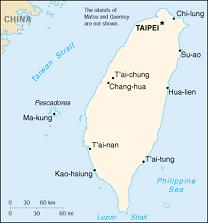 Taiwan's
total land area is only about 3,6000 square
kilometers; it is shaped like a tobacco leaf that is
narrow at both ends. It lies off the southeastern
coast of mainland Asia, across the Taiwan Straits
from Mainland China-- a solitary island on the
western edge of the Pacific Ocean. To the north lies
Japan and Okinawa, to the south is the Philippines.
Many airlines fly to Taiwan, helping make it the
perfect travel destination. Taiwan is 394 kilometers
(245 miles) long and 144 kilometers (89.5 miles)
wide at its broadest point. The Central Mountain
Range bisects Taiwan from north to south and about
two-thirds of the island is covered with forested
peaks. The rest of the island is made up of
foothills, terraced flatlands, and coastal plains
and basins. Taiwan includes Taiwan Island, the
Penghu Islands --a group of 64 islands, and 80 other
smaller neighboring islands and islets. Taiwan's
total land area is only about 3,6000 square
kilometers; it is shaped like a tobacco leaf that is
narrow at both ends. It lies off the southeastern
coast of mainland Asia, across the Taiwan Straits
from Mainland China-- a solitary island on the
western edge of the Pacific Ocean. To the north lies
Japan and Okinawa, to the south is the Philippines.
Many airlines fly to Taiwan, helping make it the
perfect travel destination. Taiwan is 394 kilometers
(245 miles) long and 144 kilometers (89.5 miles)
wide at its broadest point. The Central Mountain
Range bisects Taiwan from north to south and about
two-thirds of the island is covered with forested
peaks. The rest of the island is made up of
foothills, terraced flatlands, and coastal plains
and basins. Taiwan includes Taiwan Island, the
Penghu Islands --a group of 64 islands, and 80 other
smaller neighboring islands and islets.
Population
Taiwan has a population of 23 million. The larger
part of the island's inhabitants are the descendants
of immigrants from the various provinces of mainland
China, but in particular from the southeastern
coastal provinces of Fujian and Guangdong. Because
the different ethnic groups have fairly well
integrated, differences that originally existed
between people from different provinces have
gradually disappeared.
Language
The official language of Taiwan is Mandarin Chinese
(Guoyu), but because many Taiwanese are of southern
Fujianese descent, Min-nan (the Southern Min
dialect, or Holo) is also widely spoken. The smaller
groups of Hakka people and aborigines have also
preserved their own languages. Many elderly people
can also speak some Japanese, as they were subjected
to Japanese education before Taiwan was returned to
Chinese rule in 1945 after the Japanese occupation
which lasted for half a century.
The most popular foreign language in Taiwan is
English, which is part of the regular school
curriculum. However, to be on the safe side, when
taking a taxi in Taiwan it is advisable to prepare a
note with your place of destination written in
Chinese to show the taxi driver.
Economy
Taiwan's economy in 2004 is experiencing strong
growth, building upon a robust year in 2003. The
3.2% real GDP growth recorded in 2003 reflects the
second-quarter dip caused by the outbreak of SARS,
but export-led growth and swelling consumer demand
are contributing to an expected rate of 5.3% real
GDP growth in 2004. Taiwan's economy is heavily
oriented toward the manufacturing of consumer
electronics products. Growing worldwide demand,
bolstered by economic recovery in the United States,
as well as growing demand in mainland China for
industrial goods pushed the value of Taiwanese
exports up around 22% year-on-year in April 2004.
Taiwan was admitted to membership in the World Trade
Organization (WTO) in November 2001, concurrently
with China's admission. Unlike China, Taiwan has
been admitted to the WTO as a "developed country,"
which imposes more stringent requirements for
reducing barriers to foreign competition. Taiwan
recently has lifted some restrictions on direct
trade with and investment in mainland China, which
is expected to increase cross-strait commercial
ties.
Cuisine
The culinary culture of the Chinese people goes back
a very long time; and while Chinese food can be
enjoyed in every large city in the world today, true
gourmets know that only in Taiwan is it possible to
enjoy fine authentic cuisine from all the different
regions of China. In Taiwan, where it seems the
people live to eat, it is said that there is a snack
shop every three steps and a restaurant every five.
These establishments serve all kinds of Chinese
food, from the roast duck, smoked chicken, lamb
hotpot, fish in wine sauce, beef with green peppers,
and scallop and turnip balls of the north to the
camphor-tea duck, salty fried chicken with spices,
honey ham, stir-fried shrimp, dry-fried eggplant,
and spicy bean curd of the south. As the island's
economy has developed rapidly in recent years, its
culinary culture has expanded beyond the traditional
Chinese foods to Chinese-style fast-food chains,
thus bringing greater complexity than ever before to
the art of Chinese dining. Foreign foods from all
over the world have also made their appearance in
Taiwan, and the island is now filled with eateries
serving American hamburgers, Italian pizza, Japanese
sashimi, German pig's knuckles, Swiss fondue, and
just about everything else. All of this makes Taiwan
a veritable paradise for gourmands. Taiwan's own
native cuisine has also become known around the
world, and if you try it just once you will remember
it forever.
Visas
Foreign nationals holding passports or travel
documents valid for more than six months may obtain
tourist visas if they are in Taiwan for the purposes
of sightseeing, business, family visits, study or
training, medical treatment, or other legitimate
activities.
30-day visa-free privileges are offered to citizens
of 25 countries and 30-day landing visas are offered
to citizens of 28 countries. For further
information, please visit the website
www.boca.gov.tw/english/index.htm
Please do not hesitate to contact us if you have
any problems applying for Taiwan visa.
Currency and Exchange
The monetary unit is the New Taiwan dollar (NT$),
which has five denominations in paper and four in
coin. Paper money is in NT$2,000, NT$1,000, NT$500,
NT$200 and NT$100 notes. Coins are in NT$50, NT$10,
NT$5 and NT$1 denominations.
Each participant is entitled to depart with currency
of up to US$5,000 in cash or the equivalent in other
foreign currencies. Excess amounts must be declared
to and recorded by the Customs. Also, up to
NT$40,000 in cash may be carried. Larger amounts are
allowed only if a permit has been obtained from the
Central Bank of Taiwan.
Foreign currency can be exchanged at most banks,
hotels and international airports.
Please visit the Currency Converter website at
www.xe.net/ucc
Exchange rate:
USD$1=NTD$34.00 EUR 1 =NTD$41.60E
Credit Cards
All major credit cards are accepted in most hotels,
shops and restaurants. The most widely accepted
credit cards are Visa and MasterCard. Restaurants
and shops generally display signs indicating which
cards are accepted.
Banking and Business Hours
Banking hours are from 9:00 a.m. to 3:30 p.m. Monday
to Friday.
Office hours for government agencies are from 8:30
a.m. to 5:30 p.m. on weekdays. Private companies are
usually more flexible with working hours, and often
decide their own schedule.
Please be informed that there are no public holidays
on the dates of our conference.
Electricity
Taiwan uses electric current at 110 volts AC/60 Hz.
Many hotels also provide outlets for 220-volt
appliances.
The type of plug is Type A, same as US and Japan.
Drinking Water
Taipei¡¦s tap water in Taipei is soft, chlorinated.
Tap water is drinkable but drinking unboiled water
is not recommended. Most hotels provide boiled
drinking water. Bottled spring water is easily
available at convenience stores and supermarkets.
Time Zone
Taiwan is 8 hours ahead of Greenwich Mean Time
(GMT+0800). There is no daylight saving time in
Taiwan.
Tipping and Taxes
Tipping is not customary in most places in Taiwan. A
10% service charge and a 5% value-added tax are
added to room rates and meals. Other tipping is
optional, but rare, including for Taxis.
Insurance
Participants are advised to carry adequate travel
and health insurance, as the organizer cannot accept
liability for accidents, illness, or injuries that
may occur at or during the Conference.
Climate
Taipei has a subtropical climate, with an average
temperature of 22 degrees centigrade (72 degrees
Fahrenheit). Autumn, from October to November, is
probably the most pleasant time to visit Taipei,
with average temperatures of 23¢XC (73¢XF). The island
is affected by typhoons during summer, but they do
not have a long-term impact. For more information on
Taiwan's climate, please refer to the website of the
Central Weather Bureau at http://www.cwb.gov.tw/
Earthquake Survival Tips
Taiwan is located in a seismically active region. We
would like to remind in the case of an earthquake,
the following measures are recommended:
1. Stay where you are and do not panic. Most quake
injuries occur as people enter or leave buildings.
The greatest danger is from falling objects just
outside of doorways and walls.
2. Stay away from windows, mirrors, or glass that
might shatter.
3. Stay away from stoves, heating units and
fireplaces.
4. If you are indoors, get under a sturdy desk or
table.
5. If you are outdoors, be sure to stay clear of
electricity lines and poles, trees or branches,
external stairs or anything that might fall.
6. DO NOT try to use the elevators or stairs during
a quake.
Airport
CKS International Airport (TPE) is the international
airport closest to Taipei. For further information,
please visit the website¡G
http://www.cksairport.gov.tw
From Airport to Conference
hotels
Airport Limousine Bus & Taxi
 
Five coach companies now provide frequent service
between CKS International Airport and Taipei. You
may take KUO-GUANG Airport Limousine bus, which
offers a direct route to Taipei Main Station. From
Taipei Main Station, you can take a taxi directly to
the conference Hotels in 10 minutes.
1. Ticket counters are located in the arrival
reception areas of both terminals.
2. Airport Limousine bus bound for Taipei Main
Station departs every 20 ~ 30 minutes.
3. Adult single fare is NT$120 (around US$3.5).
4. The journey time is about 1 hour in moderate
traffic.
¡@
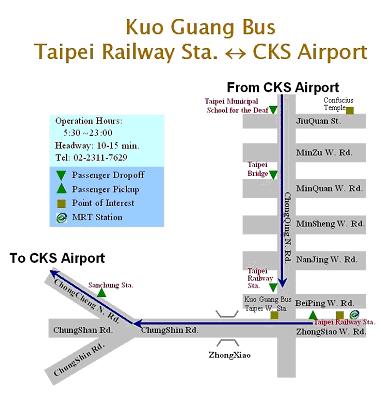
Taxis

Taxis queue outside the Arrival Halls of both
terminals. The service is also provided 24 hours a
day. Airport Taxis charge according to the meter
plus a 50% surcharge (highway tolls not included)
and typically costs around NT$1,200(around US$36) to
Taipei. It takes approximately 50 mins in moderate
traffic.
**Please do not hesitate to call us if the
information provided is unclear or you have any
problems on the way to the conference venue.
Transportation
Taxi

There are many taxis operating in and around Taipei.
All are yellow and display a light on the roof when
vacant. The rate for taxis in Taipei is NT 70 for
the first 1.5 kilometers and NT 5 for each
additional 350 meters. A 20% surcharge is added
between 11p.m. and 6 a.m. and a "waiting surcharge"
for each 3 minutes is added when the taxi is stopped
or is traveling at less than 5 kilometers per hour.
Most taxi drivers cannot speak or read English, so
providing the destination in Chinese characters or a
map is helpful. Toll Free Taxi Hotline: 0800-055850.
¡@
MRT


The mass rapid transit system (MRT) in Taipei, along
with the metropolitan area's dedicated bus route
network, form a convenient transportation system.
The MRT currently has five lines in operation: the
Brown Line (Mucha), the Red Line (Tamshui), the
Orange Line (Chungho), the Green Line (Hsintien),
and the Blue Line (Kunyang to Hsinpu). The five
lines pass by a variety of attractions and scenic
spots, and visitors can take a leisurely journey
around Taipei and its suburbs by using the MRT
system. Auto ticketing machines can be found in MRT
stations, and all stations are equipped with change
machines. Single-journey ticket prices range from
NT$20~NT$65 depending on the distance traveled. A
150-dollar "One-day pass" purchased from service
booths will allow unlimited travel along all MRT
lines within one day.
Please Note:
¡· MRT operating hours¡Ð06:00~24:00
¡· To provide passengers with a comfortable and safe
ride, smoking, drinking & gum chewing are strictly
prohibited in the paid area, and food consumption is
only permitted in designated areas.
¡· Using a cellular phone is prohibited in the first
and the last cars of the train.
¡· Tickets are valid on the day of purchase.
For more information, please check Taipei Rapid
Transit Corporation (Metro Taipei) at
http://www.trtc.com.tw
Bus

Buses are one of the most important means of
transportation in Taipei, with almost 200 routes
stretching throughout the city. They run every 5-10
minutes and operate on an express lane grid system,
making transfers easy. The fare for traveling within
one section is NT$15 per section. Buses do not
provide change. Most bus services run until 23:00.
EasyCard

Since 2002, all local buses and MRT stations accept
EasyCard, a stored-valued smart card used for all
modes of transit. An EasyCard is sold for NT$500,
which includes $400 stored-value and $100 refundable
deposit. EasyCard can be bought and added value at
MRT stations and convenience stores throughout
Taipei City and Taipei County.
Insurance
Participants are advised to carry adequate travel
and health insurance, as the organizer cannot accept
liability for accidents, illness, or injuries that
may occur at or during the meeting.
Useful Phone Numbers
Tourist Service Center: (02) 2717-3737
Bureau of Consular Affairs (MOFA): (02) 2343-2888
Chinese Operator: 104
English Operator: 106
Fire and ambulance: 119
Police: 110
How to dial international
calls
International Direct Dialing from Taiwan
¡¯International dialing prefix 002, 009, 019
¡¯Country code
¡¯Area code (omit "0")
¡¯Phone number
International Direct Dialing to Taiwan
¡¯International dialing prefix
¡¯Taiwan country code (886)
¡¯Taiwan area code (omit "0")
¡¯Phone number
For more country code search and rate information
please visit :
www.eyp.com.tw/rates/index.php?lang=eng
Telecommunications
In Taiwan, mobile phones are under the GSM system.
When you travel to Taiwan and if you are using the
same system, you will be able to make and receive
calls to/from abroad with the international roaming
service. However, another option for making calls
while in Taiwan is to purchase a local SIM card.
These are widely available throughout Taiwan from
telecom companies and convenience stores.
If you prefer the traditional method, public phones
are also conveniently located. Public phones in
Taiwan are divided into two types, coin and card.
Coin phones accept coins in denominations of NT$1,
NT$5, and NT10. For local calls, NT$1 buys one
minute of phone time. Phone cards are divided into
magnetic strip stored value cards and IC stored
value cards, and can be used all over Taiwan.
Magnetic strip cards sell for NT$100 each, and IC
cards are available in NT$200 and NT$300 versions.
The cards are sold in railway stations, bus
stations, scenic spots, and convenience stores. For
English directory assistance, dial 106.
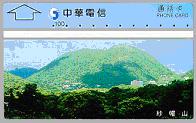
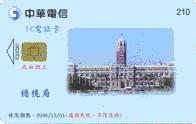
Taipei in Brief
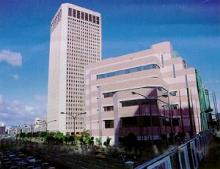 As
the capital of the Republic of China, Taipei is a
vibrant blend of traditional culture and
cosmopolitan life. Taipei is the political,
economic, educational and recreational center of the
country with large numbers of significant cultural
sights located throughout the city. As
the capital of the Republic of China, Taipei is a
vibrant blend of traditional culture and
cosmopolitan life. Taipei is the political,
economic, educational and recreational center of the
country with large numbers of significant cultural
sights located throughout the city.
Taipei is nestled in a basin with mountains on all
sides and covers an area of 271.77 square kilometers
(27,177 hectares). The city is divided into 12
districts. The population has reached to 2,624,858
(July 2004), making it one of the most crowded
cities in the world. The city is situated in a basin
in the north of Taiwan that was originally inhabited
by aboriginal peoples until settlers from China
moved into the area about 300 years ago. The first
settlements were in present day Wanhua and Datong.
These two western districts, being the first
permanent settlements of Chinese migrants, retain
many of the old customs, as evidenced in the
architecture, sculptures, and ceremonial activities
that take place in the old streets and temples.
A more recent cultural focal point in the city is
the National Palace Museum, which houses hundreds of
thousands of Chinese antiques and art works. The
museum is located in the north of the city and is a
must see for lovers of ancient Chinese culture.
The eastern section of the city was largely
underused fields until the 1970s when the city began
to develop the area as a financial and commercial
district. This area reveals the modern face of
Taipei with its glass and steel skyscrapers, wide
boulevards and the World Trade Center.
Taipei also boasts dozens of world-class performance
venues to enjoy some of the best theater and concert
events. The city also offers a wide range of other
diversions, with shopping malls, nightclubs and
music bars, high-quality hotels and exotic
restaurants.
With the wealth of interesting and fun activities
available in Taipei and the city's warm reception
extended to guests, foreign visitors are certain to
have an unforgettable experience in this remarkable
city. |


 Taiwan's
total land area is only about 3,6000 square
kilometers; it is shaped like a tobacco leaf that is
narrow at both ends. It lies off the southeastern
coast of mainland Asia, across the Taiwan Straits
from Mainland China-- a solitary island on the
western edge of the Pacific Ocean. To the north lies
Japan and Okinawa, to the south is the Philippines.
Many airlines fly to Taiwan, helping make it the
perfect travel destination. Taiwan is 394 kilometers
(245 miles) long and 144 kilometers (89.5 miles)
wide at its broadest point. The Central Mountain
Range bisects Taiwan from north to south and about
two-thirds of the island is covered with forested
peaks. The rest of the island is made up of
foothills, terraced flatlands, and coastal plains
and basins. Taiwan includes Taiwan Island, the
Penghu Islands --a group of 64 islands, and 80 other
smaller neighboring islands and islets.
Taiwan's
total land area is only about 3,6000 square
kilometers; it is shaped like a tobacco leaf that is
narrow at both ends. It lies off the southeastern
coast of mainland Asia, across the Taiwan Straits
from Mainland China-- a solitary island on the
western edge of the Pacific Ocean. To the north lies
Japan and Okinawa, to the south is the Philippines.
Many airlines fly to Taiwan, helping make it the
perfect travel destination. Taiwan is 394 kilometers
(245 miles) long and 144 kilometers (89.5 miles)
wide at its broadest point. The Central Mountain
Range bisects Taiwan from north to south and about
two-thirds of the island is covered with forested
peaks. The rest of the island is made up of
foothills, terraced flatlands, and coastal plains
and basins. Taiwan includes Taiwan Island, the
Penghu Islands --a group of 64 islands, and 80 other
smaller neighboring islands and islets. 





 As
the capital of the Republic of China, Taipei is a
vibrant blend of traditional culture and
cosmopolitan life. Taipei is the political,
economic, educational and recreational center of the
country with large numbers of significant cultural
sights located throughout the city.
As
the capital of the Republic of China, Taipei is a
vibrant blend of traditional culture and
cosmopolitan life. Taipei is the political,
economic, educational and recreational center of the
country with large numbers of significant cultural
sights located throughout the city.